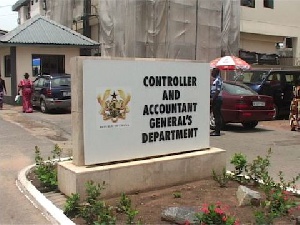Following the expose of the fraudulent activities going on the Government of Ghana payroll, Cabinet has finally set up a sub-committee to look into the allegations and come out with solutions that would set the heart of Ghanaians at ease.
Mr. Seth Terkper, the Finance Minister, who announced this at some of the radio stations in Accra over the weekend would, however, not accept any blame over the failure of the Controller and Accountant General Department (CAGD) to implement his predecessor, Dr. Kwabena Dufuor’s letter.
Dr. Dufuor, whilst in office as Finance Minister, wrote a letter to the CAGD, ordering them to migrate all workers on government payroll onto ‘Akatua’, a new software that had been developed by SOFTtribe, a Ghanaian Information, Communication Technology (ICT) company after detecting the inaccuracies of figures being churned out by the old software being used by the CADG. Unfortunately, Dr. Dufuor’s orders were not executed when he left office in January 2012.
Though the Controller and Accountant General (CAG), Grace Adzroe had confirmed in a release issued last week Friday that a Cabinet Committee had been constituted, which is working with the relevant institutions to address what she described as ‘payroll challenges’, policy Think Tank, Imani Ghana, says it is completely against the pronouncement by both CAG and the Finance Minister, Seth Terkper.
The founding president of the group, Mr. Franklin Cudjoe, told The Chronicle in an interview over the weekend that Cabinet had been around all these years, yet it failed to deal with the issue of ghost names on the government payroll and that he did not trust them to come out with any new measures that would deal with the problem once and for all.
According to Imani, what Ghana needed at the moment was a public forum where all Ghanaians would have the opportunity to contribute on how to eliminate the ghost names and make the government payroll more credible.
The issue of ghost names has always been an albatross hanging on the neck of successive governments. Economic giants like Mr. Yaw Osafo Maafo, the late Kwadwo Baah Wiredu, Dr. Anthony Akoto Osei and Dr. Kwabena Dufuor have all done their best to eliminate the canker, but they failed to achieve their aim.
The payroll fraud has also compelled the European Union to withhold a staggering £135m out of the £400m the Union allocated to Ghana.
According Sunday Times in a report it published in December last year, Britain, which is the largest individual donor to Ghana, has allocated £250m in aid for the 2012-15 period. More than £9m has been withheld this year (2014) following the revelations about the ghost workers and Ghana’s wider budgetary problems.
Conservative estimates show that about 1% of Ghana’s Gross Domestic Products (GDP) is spent on these fictitious names, popularly referred to as ghost names.
Already, a little over 600,000 workers on the government payroll are consuming GHc9 billion of the revenue generated by the state.
The figure was expected to increase to GHc11 billion in December last year up from GHc1.7billion, that was been spent on these same workers before the introduction of the Single Spine Salary pay policy.
There are, however, a strong believe that some of these workers are not actually working for the government and that some unscrupulous people have fraudulently inserted their names on the payroll, collected the money at the end of each month and pocketed them.
A senior IMF official in Ghana, who spoke to the Sunday Times said: “Is there a massive fraud involving foreign aid fund? We will not know the extent of it until a thorough reform has taken place, but it is apparent that the huge increase in the public payroll is the main reason for the growing deficit.”
A senior EU source said the abuse of European funds in Ghana was not as bad as the “grand larceny” going on in some other African countries that receive aid from both Brussels and national capitals such as London.
“We have no hard evidence of the number of ghost workers but the [state employees’] wage bill makes up 70% of government spending and some estimates put the [ghost workers’] figure at 20%,” the source told the Sunday Times.
So far no government of Ghana official has been implicated in the fraudulent activities going on the payroll as exposed by KPMG, an international audit firm and being reported by both local and the international media.
Industry players who spoke to The Chronicle, however, argued that the fraud seems to be a handiwork of a cabal operating at both the CAGD and the various ministries and department.
General News of Monday, 26 January 2015
Source: The Chronicle

















